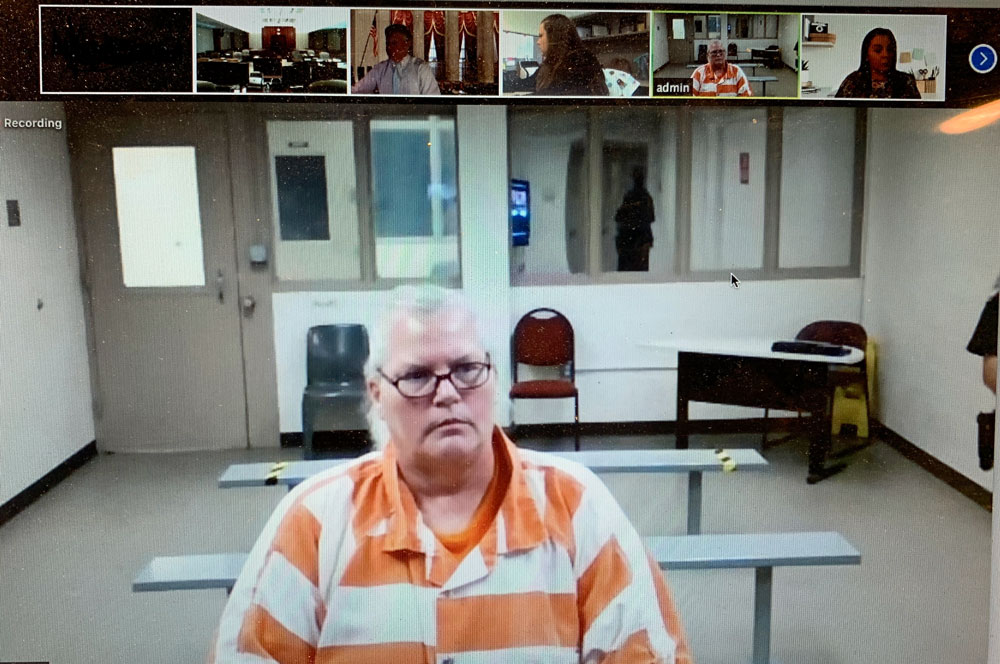
For the second time in two years, Dorothy Singer was sentenced for the murder of her husband, this time getting less than life in prison, though it might as well be a life term: the 55-year-old former resident of west Flagler was sentenced to 32.5 years in prison.
Even with credit for the three years she’s already served, and even if she is eligible for early release after serving the mandatory 25 years of her sentence, she would be 78 by then.
“You’re now charged to a reduced charge of second degree murder with a firearm. It’s still punishable by life. How do you plead?” Circuit Judge Terence Perkins asked her this afternoon in a Zoom hearing: Perkins was at his end, with the image of the United States Supreme Court as backdrop, Singer was at hers–the Flagler County jail, with the reality of the county jail and a corrections deputy as backdrop. She sat on a bench in her striped orange and white jail garb, facing the camera.
“No contest,” Singer said.
She had actually been eligible for a retrial. Likely calculating that the outcome would not be different–the evidence against her was overwhelming, she had come across as a surly, wily and unrepentant defendant–she opted to plead to second-degree murder. Instead of another week-long trial to be held who knows when, given the Covid-ridden circumstances, the hearing took all of 25 minutes, and within the week Singer is set to return to Lowell state prison in Ocala, though it’s possible the Department of Corrections may transfer her to a different facility, now that the crime for which she’s been sentenced has changed.
Two years ago this month a jury found Dorothy Singer guilty of premeditated, first-degree murder in the shooting death of her then-48-year-old husband Charles a year earlier. She had shot him five times, had buried him clumped in mothballs in her property’s backyard, hidden the grave under brush and a jon boat, and spent the next months making up stories to family and repeatedly lying to law enforcement, at times in her own home, a few dozen feet from where she’d buried Charles. Cadaver dogs and detectives’ sharp eyes eventually located the grave.
Singer was arrested after attempting to flee the county and possibly fake her own death: she’d written a suicide note.
Immediately after the verdict, Circuit Judge Dennis Craig, who’d presided over the trial, sentenced her to life in prison. Soon after that, she appealed.
She had reason to, as anyone who’d witnessed what took place in the courtroom the day her trial started, and during preceding hearings, suspected. For months there had been little sympathy between Craig and Junior Barrett, Singer’s attorney. Judge and lawyer sparred in pre-trial hearings, and they sparred the first day of trial, before jury selection. Barrett had used various means to get continuances. Most lawyers do, especially in a first-degree murder case. But Craig was losing patience. He was about to be transferred to felony court in Volusia County and he wanted to get the Singer trial done.

Barrett filed the appeal, and last November the Fifth District Court of Appeal granted the appeal in part, finding that after the DNA evidence emerged, “twelve days was wholly inadequate to prepare for trial.” The court ordered a new trial.
That process began in December, this time before Perkins. After a few hearings, Singer agreed to the plea.
“Based on that plea,” Perkins told her, “I adjudicate you guilty of the charge, sentencing you to 32 and a half years Department of Corrections, giving you full credit for what I believe is–both jail and Department of Corrections credit–1,092 days.” (Courts rarely refer to prison as such, referring instead to “Department of Corrections.”)
Barrett and Assistant State Attorney Jennifer Dunton, who’d prosecuted the case, were also part of the Zoom conference, as were Charles Singer’s mother and his sister. “The state discussed this agreement with them, and for closure and due to the nature of the agreement, they were in favor of this plea,” Dunton said. The family members declined to speak.
“Ms. Singer, anything you;d like to say or any questions that you might have?” Perkins asked Singer.
“No, sir,” she told him.
Singer still has the right to appeal the sentence.





























Greg Jolley says
Thank you as always for the great coverage!